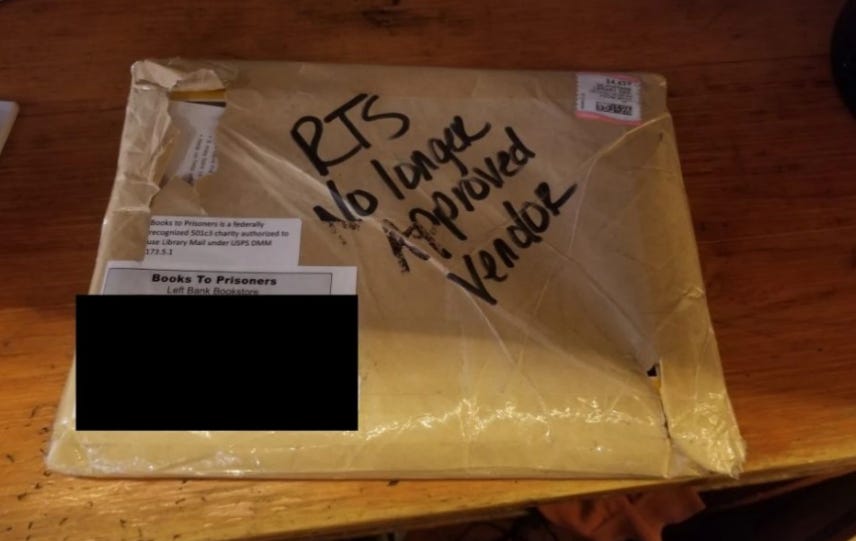Confession #17: Shakespeare is Contraband
Do we want them rehabilitated or not?
In the middle of an escalating argument years ago, my ex-husband likened the piles of my books all over our home to crack cocaine— pointing at the stack on my end table he called me out, “This is your drug!”
Touché (though painfully ironic, given that actual addiction has since destroyed our family).
As with everything in our American prison system, supporting an incarcerated loved one from the outside is challenging by design. Even the most benign attempts to assist rehabilitation— like sending a book— become mired in rejection notices, days of clarification emails, screenshots, re-orders, and unnecessary fees.
Last week, the assistant warden at my son’s prison emailed me a request after I sent the usual receipt for a book order. This particular assistant warden and I have already gone three rounds this year, and like my ex-husband, he is learning that I don't play (especially if we’re talking books).
As the DOC website states, members of the public are ‘allowed’ to send incarcerated individuals reading material. And I quote:
Prisoners may receive publications ordered by members of the public from the following Internet vendors, provided the publication is not used and is sent directly to the prisoner from the Internet vendors: Amazon, Barnes and Noble, Prison Legal News, and Walmart. ICYMI—
You may not send a book from your home.
You may not send a used copy of a book from anywhere.
You may not send anything from a third-party seller.
All books going into American prisons must be in brand-new condition and come directly from the publisher. After years of experimenting with various vendors, Amazon has proven the only reliable source. Other retailers cannot seem to navigate the byzantine shipping policies which, if bungled, result in months-long delays and outright rejection of your order.
The most important requirement is that each book is tied to the sender and source by a detailed receipt. How that receipt is received, and by whom, depends on who you ask or in which facility your loved one is being held.
When I was new to this, I was informed that the receipt just needed to be in the box when the book arrived to the mailroom, so I took pains to make sure that I selected the ‘include gift receipt’ option for any order that I placed. During Covid, however, our books started getting rejected for ‘not having receipts’— though I’m sure it had nothing to do with staffing constraints (it had everything to do with staffing constraints).
So—
In addition to the boxed receipt, I started sending a screenshot of any book order directly to the assistant warden’s email address to be passed onto mailroom staff because we are not allowed to have mailroom staff emails (that would be too efficient). This process worked well at one facility, but when my son moved to a new prison, I started getting pushback.
Last January, I was informed that a specific receipt would be required henceforth and screenshots of orders would no longer do. So, after every order, I worked to retrieve the proper ‘Invoice Copy’ receipt from the Amazon web browser (which requires a computer login), and this practice sufficed for six whole months.
Last Tuesday, the reply from the assistant warden was— “Can you please send the receipt via JPay to the prisoner - thank you.”
It was not a question.
I sat there with my finger hovering above the reply arrow (IT’S IN AN AMAZON BOX WITH AN AMAZON RECEIPT. DO YOUR F’ING JOBS!!) but I know better. In my head, I responded in a way that made me feel much better and I then paid to send the receipts again via JPay.
I did reply the next morning with a sincere question for the warden— “Do we want our incarcerated (especially those being denied programming and employment) to be rehabilitated or not?”
He simply answered, “Thank you for sending the receipts to his JPay account.”
What a snide little ferret.
My question is NOT rhetorical.
Aside from the obvious bafflement over how difficult it is to get legitimate reading material into a prison, what they are doing is, literally, criminal.
Requiring me (and thousands of other families) to pay a for-profit company to send the copy of an already-sent receipt is straight-up racketeering. JPay is a paid messaging service. The digital stamps to email my son cost me 40 cents apiece, and it's an additional 40 cents to attach any photos or files (like a receipt) to the message. At the moment, my son has three books waiting for him in Property so this was an additional $1.20 to communicate for the third time where his damn books are coming from. After I was forced to pay honeymooning Jeff Bezos full price.
On the other side of the fence, my son is forced to pay 40 cents to print each one of those receipts. Another $1.20. When he attempted to turn them into his PC, he was told receipts are to go to the business office and they were slid back under his cell door. Due to his status, my son does not have access to the business office in his facility— so all of this JPay business got us nowhere and 8 weeks later, he's still waiting on books that I sent in May.
I know, I know. Prison isn't meant to be summer camp and it's hard for a reason. But even if I just shut up and follow the ever-changing rules, am I expected to tolerate theft of what I pay for as well?
DOCs all over this country steal and destroy our rightful property every day. When a book is declined in the prison mailroom, the incarcerated recipient is notified of the rejection and they can ‘choose’ one of three options for said book within 15 days:
Return the package to the sender at the “prisoner’s expense”
Hold it at the facility for pick-up by another individual (within 15 days)
Have it ‘destroyed’
Without money and without a loved one residing anywhere near the prison, all of our book rejections have been systematically ‘destroyed’ by staff. Per policy. Blocked books are not placed in a shared library nor given to charity or schools— they are not even shelved in a staff reading room (insert nasty comments about meat-head corrections staff here) because all of that would make too much sense. Passing learning on to others borders on kindness, and that just is not an option under the banner of American corrections. Instead, the books go into the trash.
I am sure ‘destroyed’ also takes various forms (like landing in the backpack of a staffer) but I want my fellow book addicts to know that this is happening with your tax dollars. Scores of non-custody prison staffers are paid every day to go into work to throw away perfectly lovely books that someone else paid for— and absolutely no one is being held accountable for this behavior.
I have a faithful and loving friend who sends my son a book or two every month. We have a routine— she sends him a book and then texts me a copy of the receipt which I then send on to the warden’s office. And now to JPay.
Selections have ranged from the essential Man’s Search for Meaning to the humorous Walk In The Woods to Sci-Fi and Memoir and joke books and brain-teasers. These have been a lifeline to a man who has not had a family visit in over a year nor access to a TV. Our books have been his only means of rehabilitation for over two years— the givers of meaning and connection to the world beyond his lonely cell. Though I have never and will never see where he lives, my son tells me that he has books stacked neatly all around him and that his footlocker is full of more— and this always makes me smile. There is a joke in here somewhere about crack cocaine and the one addiction that I am happy to have passed along.
When he was asked last week in his parole hearing how he is managing his mental health, my son shared about his therapist, of course, and then about managing only what is within his control at any given moment (ala Man’s Search for Meaning)— and then he spoke of his steady flow of books and his commitment to reading.
On the phone this week, he laughed as he told me, “I think I would be a straight-A student in college now.” This, from a young man who has been allergic to study for as long as I have known him. Prison time has been useful in at least one way— when the books actually make it to his cell.
There are a few organizations in our country to whom, if I am ever rich, I will bequeath obscene amounts of money— Books Through Bars (NY) and Prison Book Program (Quincy, Mass). These volunteer-run, nonprofit organizations send thousands of books, for free, into prisons each year. In 2023, the Prison Book Program managed to get 60,000 books inside— solely on volunteer energy and in the face of increasing bans. As of mid‑2024, our state banned their services. As did Wisconsin. These types of book restrictions are increasing nationwide, in spite of having access to the best drug and contraband detection systems in history.
The State of Texas is, of course, not a fan of donated books. They, like other states, have faced civil lawsuits for their stringent book-blocking policies. Rightfully so. The Texas Department of Criminal Justice has systematically banned over 10,265 titles— most on the grounds of sexually explicit, violent, or other potentially harmful content but let's be real— Shakespeare’s Love Sonnets seems pretty low risk. Among the books which have also been blocked for ‘security concerns’ are The Color Purple, Freakonomics, and Beekeeping for Dummies.
Florida prison mailrooms are also busy, busy with over 23,000 books on their banned list. Disallowing Merriam-Webster’s Visual Dictionary is a new low, even for them.
Anytime I mention this reality out loud, people crinkle their face and ask, “But why?” and then they always say, “That makes no sense.”
Books coming through prison mailrooms get banned for all kinds of vague and inconsistent reasons— mostly under generic concerns relating to "promoting criminal thinking” or "inciting disruption.” Our state blocks all publications deemed “sexually explicit, obscene, or promoting criminal behavior” but books may also be withheld for having too much glue in the binding or having heft enough to wield as a weapon or for the book’s odd cover art. Often, censorship decisions are left to individual mailroom staffers who are likely untrained in literature and self-interpreting inconsistent guidelines.
A friend of mine’s incarcerated husband was denied a crafting book as a matter of “security.” In our state alone, over 60 titles related to computers, electronics, coding, HVAC, and wiring are restricted due to “safety concerns.”
Okay— maybe there is a far-flung argument that the next Andy Dufresne could order a book about sewer systems that would aid him in a 1960s-style prison break, but Brave New World is also on our ban list and that would be funny if not such a sick parody.
Like Texas, our state has also banned dictionaries— including Spanish and Swahili. In a public statement made by a department official, our DOC defended their actions, “If certain prisoners all decided to learn a very obscure language, they would be able to then speak freely in front of staff and others about introducing contraband or assaulting staff or assaulting another prisoner… When it's in a language that we don’t have the ability to read ourselves and understand exactly what it is that we’re looking for, we’re not able to allow it in.” As Lit Hub editor Jessie Gaynor pointed out, 13% of our population speaks Spanish as a first language— making Spanish text anything but ‘obscure.’
In separate but related news, that same secret-busting DOC employee recently resigned after he was caught sending blow-job videos to an unsuspecting female employee. Turns out, he was sexually harassing other subordinates in the department as well. He is currently embroiled in civil lawsuits but, two years later, no criminal charges have been filed because he was allowed to resign before an investigation was opened by his bosses. Seems the DOC has bigger fish to fry, including incarcerated folks just trying to read some books.
And yet.
We cannot let the ignorant drag us down.
On Robben Island, where Nelson Mandela was imprisoned for 18 years of his 27 behind bars, books hardly ever made it past the harsh censorship of apartheid policies. He writes in his memoir about how prison staff would black-out entire chapters or glue pages together to prevent their reading.
Just as Dufresne quietly worked inside the walls of Shawshank to make a way out, Mandela and his fellow incarcerated souls built what they called Robben Island University— a secret, informal, inmate-led network of education where books and smuggled texts sustained them. They read philosophy, law, literature, and economics, copying pages by hand to share when necessary.
One of the books they passed was The Complete Works of Shakespeare (like the one banned in many states today), cleverly disguised as a Hindu prayer book. It was moved cell to cell incognito and the men took turns marking their favorite passages. Mandela famously highlighted a line from Julius Caesar: “Cowards die many times before their deaths; The valiant never taste of death but once.”
I would like to send that message to a certain fear-mongering, brainwashed assistant warden this week but we are hoping for parole so I, too, shall secretly highlight it and courageously keep walking toward the goal. Thank you for your example, Mr. Mandela, and Happy Birthday. For today, I will choose to remember the overcoming, not the ignorance of systems.
If you have a suggestion for my son’s next read, please drop it in the comments or feel free to join our chat. I send him books once every two weeks.
If you would like to support learning in our local prison walls, please consider donating below to purchase a book. Though he shares them now, when he is paroled he will leave every volume that we have sent behind for his fellow men.






Omg as a bona fide book addict (I have 2500 plus) I am enraged. I’m grateful a daughter requested my book collection bequeathed to her upon my death. And for some reason it came to me to recommend Ishmael by Daniel Quinn to your son. I love everything about you, Bridget. Thank you for sharing your quest with the world. It makes us all a little bit better.
And omg again - this just reminded me of an essay I must write about being arrested, placed in jail, and a book.
Bridget, I am so happy to be following you. I learn so much from you and pass it along and pay it forward to people in my every day life.
Thank you for opening yourself up like this. It matters.